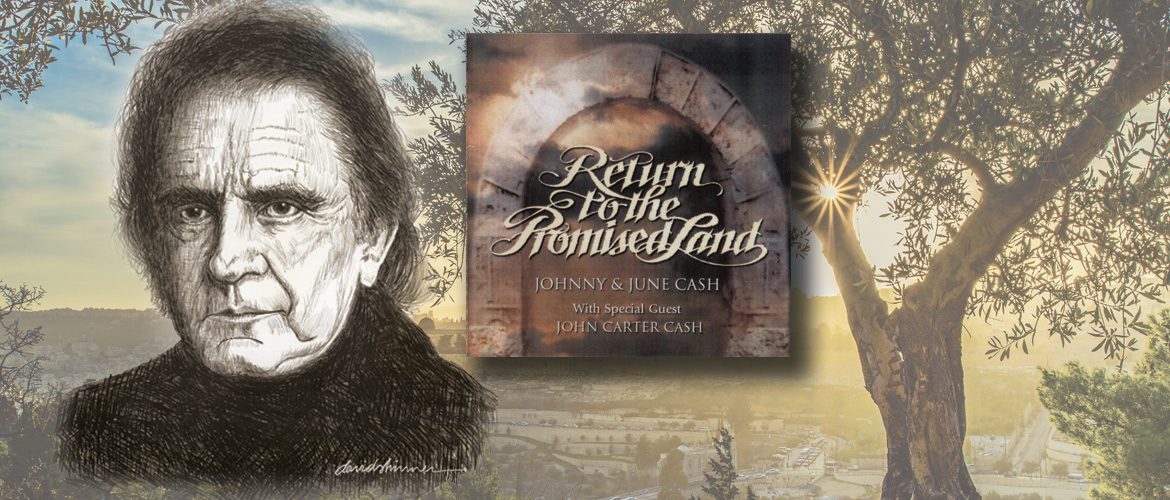By David Ray Skinner
Back in 1992, I was working with Hugh Waddell (a musician friend from my days as a songwriter in Nashville) on a project that he was handling for Johnny Cash. Hugh had previously commissioned me to design logos and artwork for shirts and backstage passes for Johnny’s various tours, so I assumed that project would be pretty much the same sort of thing. Little did I know.
It did start out as a logo. In 1990, Johnny, his wife, June Carter Cash, and their son, John Carter Cash had traveled to Israel to film a follow-up to Cash’s successful “Gospel Road” (which, in turn, had been inspired by the similarly-formatted 1968 album, “The Holy Land”). Johnny decided he would call the video, “Return to the Promised Land,” and it featured Johnny, June and John Carter playing and singing traditional gospel songs and hymns at various Holy Land locations.
I was at home in Atlanta, working on the logo when Hugh called from Nashville. He informed me that he and Johnny were going into the studio that night to do some recording and overdubbing. “There’s one problem,” Hugh said, “There is no hymn or gospel song called ‘Return to the Promised Land.’”
I told him that, if it existed, I certainly had never heard it.
“Well,” said Hugh, “Why don’t you write it?”
I jumped at the chance. “When do you need it?” I asked.
“This afternoon,” he said.
That afternoon, I called him and played what I had come up with as a “message” onto his phone machine, and I faxed him the lyrics and chord progression (this was before the internet and emails). Johnny and Hugh finished it on the way to the studio that night and the song became a recurring theme throughout the video, played in various styles on a range of instruments (here’s a link to the finished song: http://equilt.com/ReturnToThePromisedLand.mp3).
In 2009, the band, Wilco recorded Jeff Tweedy’s “You Never Know.” In the song, Tweedy declared, “Every generation thinks it’s the last—(it) thinks it’s the end of the world.” And, here it is eleven years later, and that presumption has only intensified in our culture and society as we have increasingly distanced ourselves from God. For those familiar with biblical prophecy, they know that it’s not the end of the world; there’s a lot more to come, both good and bad.
I am far from being a Bible scholar, but in recent years, I have become more and more aware of the fulfillment of prophesy, especially the “Return to the Promised Land”—the return of the Jewish people to the land that God promised to Abraham thousands of years ago. It makes me marvel at Johnny Cash’s insight to use that name for the song and video, and I feel blessed to have been a part of manifesting that concept. Lately, I’ve thought that I should add some verses to the song I wrote back in ’92 with Johnny and Hugh.
So, with the recent events, and all the end-of-the-world discussions and the more hopeful fulfillment of prophesy declarations, I decided to look into and research the how and when of the return of God’s chosen people to their ancestral land. In my book, “Rubine River,” which is partially set in the American Civil War, there are two (fictional) characters who are discussing Israel. I wrote that into the book, because I figured that in the early 1860s, if there was any sort of discussion about the Promised Land, Israel would be referred to as an ancient land from long ago, much like Persia or Babylon. Unless they knew and understood the scriptures, they would have no way of seeing into the future—when Israel would once again exist.
Consequently, my characters were stuck in the no man’s land between ancient Israel and current-day Israel, a country that wouldn’t exist again as a sovereign nation until 1948. As a Christian and history buff, I found that to be both unique and fascinating.
So, how and when did the Return to the Promised Land begin?
Some scholars believe that nineteenth century writer Samuel Langhorne Clemens—who was better known by his pen name, Mark Twain—may have unknowingly fired the starting gun. Although Mark Twain was born nearly a hundred years earlier than Cash, he was also populist folk hero, nurtured by the ebbs and flows and influences of the mighty Mississippi River (in fact, coincidentally, in 1984 Johnny performed at the dedication of the dam that would create “Mark Twain Lake,” which surrounds Florida, Missouri, Clemens’ birthplace). Mark Twain is considered by some to be the “Father of American Literature”—his book, “The Adventures of Tom Sawyer” (1876) and its sequel, “The Adventures of Huckleberry Finn” (1884) are both time-worn classics and are still studied in schools throughout the world. Mark Twain wasn’t an atheist, but he was, at the very least, a skeptic and often cynical when it came to spiritual matters. In fact, he once famously said, “Faith is believing what you know ain’t so.”
Mark Twain certainly was an unlikely choice to re-boot the return of God’s chosen people to their homeland. But, history has shown us that God has often used unlikely people to help fulfill and manifest His will. In 1867, Twain visited Palestine (which is what the Holy Land was called at that time). He wrote, “Many are Israel’s forsaken places, and great is the desecration. The more sacred the place, the greater the devastation it has suffered. Jerusalem is the most desolate place of all.”
What’s interesting is that Twain was basically paraphrasing Moses, who warned his people that if they disobeyed the Lord, He would put a curse on their land (Deuteronomy 29:22). The land itself would become “a burning waste, unsown and unproductive, and no grass grows there” (Deut. 29:23). Moses told them the curse would be so terrible that when foreigners (such as Mark Twain!) would come to visit the land, they would cry out, “Why has the Lord done such to this land? What does the heatedness of this great anger mean?” (Deut. 29:24).
But then, there’s the Jubilee. The word jubilee was derived from the Hebrew word jobel, which means “ram’s horn,” since it was precisely that horn which was used as a trump or trumpet. According to Leviticus 25:9, a loud trumpet should proclaim liberty throughout the country on the 10th day of the 7th month (the Day of Atonement), after the lapse of 7 sabbaths of years (49 years). So, every 50th year was to be announced as a Jubilee year. All real property should automatically revert to its original owner (Leviticus 25:10), and those who had sold themselves as slaves to their brothers (because of poverty) should regain their liberty (Leviticus 25:10; compare 25:39). Debts would be forgiven, and the mercies of God would be particularly bestowed.
The 1917 Jubilee
If you look at Mark Twain’s 1867 visit to the Holy Land as the starting point, and you advance 50 years—to 1917—you find yourself in the middle of World War I, and you find the Holy Land’s landowners at the time, the Ottoman Empire, in the middle of the conflict. After declaring war on the Ottoman Empire, Britain issued The Balfour Declaration, a public statement announcing support for the establishment of a “national home for the Jewish people” in Palestine. The declaration had many long-lasting consequences. It greatly encouraged Jewish communities from all over the world to return to their homeland—the Promised Land—and it became the core component of the British Mandate for Palestine, the founding document of Mandatory Palestine, which later became Israel and the Palestinian territories.
The 1967 Jubilee
Then, if you fast forward another 50 years to 1967, in June of that year, the Six-Day War was fought by Israel and the neighboring states of Egypt (known at the time as the United Arab Republic), Jordan, and Syria. Israel won and, as a result, captured and occupied the Gaza Strip and the Sinai Peninsula from Egypt, the West Bank (including East Jerusalem) from Jordan, and the Golan Heights from Syria.
The 2017 Jubilee
That brings us to the next Jubilee, the first one in this century. On December 6, 2017, U.S. President Donald Trump announced the United States’ recognition of Jerusalem as the capital of Israel and ordered the planning of the relocation of the U.S. Embassy in Israel from Tel Aviv to Jerusalem. Talk about the manifestation of prophesy. If you want to dig even deeper into the symbolism, you can start looking closely at the individuals involved in these historical events. For example, take a look at Mark Twain’s given name, Samuel Clemens. The name, Samuel means either “name of God” or “God heard.” Samuel was the last of the ruling judges in the Old Testament, and he anointed Saul to be the first King of Israel and later anointed David. As for Mark Twain’s surname, the name Clemens is of Latin origin and it means mercy. Remember, according to Leviticus, in the year of the Jubilee, the mercies of God would be particularly bestowed. There’s even symbolism of the name of the U.S. President who made the Jerusalem capital announcement—Trump, the very instrument used to announce the Jublilee.
So, what does this have to do with what’s going on in our world today?
Simple. God doesn’t have to check the Evening News to see what’s going on. He’s not nervously wringing His hands; He is in complete control. He has the script and He has the Master Plan. In fact, He has shared it in His Word. What’s more, He is our Father, our Creator and our Destiny. And, best of all He really, really loves us.
David Ray Skinner is a writer, musician, illustrator, designer and the creative director of FaithLines. His recent book, “Rubine River” is available on Amazon/Kindle, Scribd, iBooks and a variety of other online book sites. His website is DavidRaySkinner.com.


